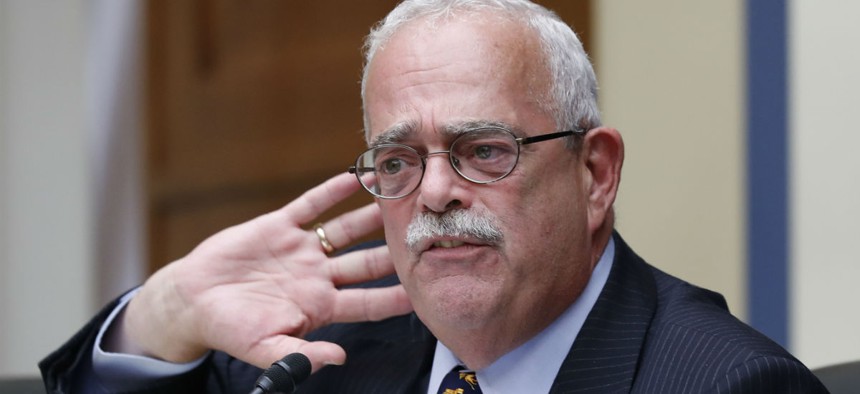Trump’s Agency Gag Orders Draw Bipartisan Criticism
House hearing on whistleblower law produces consensus on White House missteps.
A long-planned House oversight hearing on whistleblower protection on Wednesday was steered by Republicans and Democrats into a platform for criticisms of the Trump administration’s early efforts to discourage federal employees from speaking to Congress or the press.
Democrats Elijah Cummings, D-Md., and Gerry Connolly, D-Va., flagged a memo sent on Inauguration Day by Acting Health and Human Services Secretary Norris Cochran, directing that “no correspondence to public officials (e.g. Members of Congress, governors) . . . unless specifically authorized by me or my designee, shall be sent between now and Feb. 3.”
That language “appears to violate a number of federal laws, including the Whistleblower Protection Enhancement Act,” Connolly said. “And it certainly sends a chilling message to federal employees.”
Cummings said he had been informed that the Trump team “first tried to deny that this memo was sent to its employees. Then they reportedly sent out some kind of clarifying statement.” He asked committee members to join him in sending a letter demanding that HHS explain the action.
Rep. Mark Meadows, R-N.C., chairman of the Government Operations Subcommittee of the House Oversight and Government Reform Committee, announced that he and full committee Chairman Jason Chaffetz, R-Utah., had joined with Sen. Chuck Grassley, R-Iowa, in sending a Feb. 1 letter to White House Counsel Donald McGahn II. (Grassley was the author of the anti gag order provisions included in the 1989 whistleblower act.)
They asked the White House to clarify for agencies the intended purpose of such directives and “encouraged the use of whistleblowers as allies,” Meadows explained. Addressing the greater audience of whistleblowers and observers outside the hearing room, he added, “Retaliation against whistleblowers will not be tolerated. We won’t forget,” he said.
The hearing’s witnesses also agreed that recent Trump team directives described by some as “gag orders” to agencies threaten whistleblowers. “Prior restraint is the foundation for an Official Secrets Act that is incompatible with the First Amendment,” said Tom Devine, legal director of the nonprofit Government Accountability Project in written testimony he summarized. “The gags also violate the Lloyd Lafollette Act of 1912, which shields all communications by government employees with Congress, [and] the Whistleblower Protection Enhancement Act of 2012.”
Liz Hempowicz, policy counsel for the nonprofit Project on Government Oversight, said the Trump team memos “have already had a chilling effect. If whistleblowers don’t have proper channels, you will see more unauthorized leaks to the press.”
The chief purpose of the hearing was to examine the 2012 act after five years and see how it might be improved this year as some provisions expire.
Robert Storch, deputy Inspector General and Whistleblower Ombudsman at the Justice Department, outlined the extensive training and orientation program his agency has implemented at the wider department—instructional webinars, posted flyers, website backgrounders and quarterly meetings with inspector general counterparts on whistleblower protections. Confusion over the roles of IGs and the Ombudsman, who cannot provide legal counsel, he said, “could be cleaned up.”
Eric Bachman, deputy special counsel for litigation and legal affairs at the Office of Special Counsel, said the WEPA “has significantly enhanced OSC’s ability to protect federal employees from retaliation,” noting a dramatic percent increase in retaliation cases his independent agency handles (now numbering 2,000) in recent years, a 150 percent hike in OCS’s corrective actions and a 117 percent increase in related disciplinary actions at agencies.
Improvements he recommended include clarifying OSC’s authority to gain access to agency documents, more protection for former employees under investigation, and access to district courts for federal whistleblowers.
POGO’s Hempowicz said “the next round of whistleblower protection legislation must include protections for Intelligence Community contractors” as well as mandatory punishments for supervisors found to have retaliated against whistleblowers. She suggested a 12-day suspension for such a violation.
Devine said the current era is both “the best time and the worst” for whistleblowers, citing two whistleblower case he’s involved with that have dragged on for years and subjected the whistleblower to financial ruin. There remains a lack of due process and resistance by many agency managers, he said: “It is a sad truth that the OSC’s track record of 5.2 percent corrective action reflects the best option. As a rule, employee rights under the Whistleblower Protection Act continue to be a mirage when agencies violate them. Whistleblowing is more dangerous than ever.”




